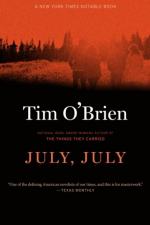|
This section contains 867 words (approx. 3 pages at 400 words per page) |

|
July, July Summary & Study Guide Description
July, July Summary & Study Guide includes comprehensive information and analysis to help you understand the book. This study guide contains the following sections:
This detailed literature summary also contains Quotes and a Free Quiz on July, July by Tim O'Brien.
The following version of this book was used to create this guide: O’Brien, Tim. July, July. Houghton, Mifflin, 2014.
It is the first weekend in July, 2000. Members of the 1969 graduating class of Darton Hall College, a small liberal arts school outside St. Paul, Minnesota, gather for their 30th reunion, a year late because of a scheduling glitch.
The first night, the reunion committee hosts a dance in the school’s gymnasium. The reunion members, now in their early 50s, drink excessively and awkwardly renew friendships. Saturday afternoon, they attend a memorial service for two deceased classmates. And that night they gather for a farewell banquet that lasts until well into Sunday morning. Over the course of the weekend, they discover at once how much they have changed and how little they have changed. They use the reunion as an opportunity to look back, to reflect on their lives and how they have handled the promise of their youth and the disappointments of their adult lives. As members of the Class of 1969, they see themselves as part of that iconic generation, the idealistic Baby Boomers coming of age during the tempestuous era of campus unrest, protests for civil rights and against the war in Vietnam. Because of a scheduling glitch, however, the 30th reunion takes places in 2000. That is the threshold of the new millennium. Thus, the attendees also look ahead and consider where their lives will go.
The novel focuses on the interactions of ten of the graduates. David Todd, once a promising baseball player and now a master carpenter, is a Vietnam veteran who lost his leg in a forgotten skirmish along the Song Tra Ky River. He is now addicted to powerful painkillers and holds animated conversations with a caustic and angry voice in his head. He married (and then divorced) Marla Dempsey, his nurse at the VA hospital and another classmate. The marriage failed, he assumed, because she could not accept his amputation. Classmate Dorothy Stier struggles with the same sense of physical handicap. She is a breast cancer survivor. Dorothy understands her cancer will return, that optimistically she has perhaps five years to live. She struggles now to get her otherwise loving husband to accept her mastectomy and, in turn, to rebuild their love. Back in 1969, Dorothy, an uptight, committed Nixon Republican, refused to accompany her boyfriend, classmate Billy McMann, to Canada when Billy decided to dodge the draft. After thirty years, Billy, now a successful hardware store manager in Winnipeg, still simmers in his resentment and anger toward Dorothy.
Marv Bertel, another successful entrepreneur (he sells mops), a self-styled Lothario, has long struggled with obesity and a bum heart. He has nursed, through multiple marriages, a crush on the sexy, vibrant Spook Spinelli. For her part, Spook’s complicated relationship profile—she balances two de facto marriages with two different men--embodies her generation's celebration of sexual freedom and sexual spontaneity. Former roommates Amy Robinson and Jan Huebner have found their relationships over the years far less exciting. Over the weekend, they commiserate each other over their bitter failed marriages even as they begin to tap into feelings that they have long had for each other. The deeply spiritual Paulette Haslo, committed for decades to service to the Lord through her Presbyterian ministry, now faces disgrace and expulsion from her church for her involvement with a married parishioner. She shares her secret with Ellie Abbott who has a devastating secret of her own. In fact, she decides the weekend of the reunion is the time to tell her husband about a brief and tragic affair she had with another classmate, a married dentist named Harmon Osterberg. During an ill-fated weekend getaway together to a remote Minnesota lake resort, Ellie watched helplessly from the shore as Herman drowned. The reunion, in fact, has scheduled a memorial service for Herman and Karen Burns, a health care provider who just weeks before the reunion was murdered out in Arizona when she got involved with a psychopathic drug dealer.
By the end of the weekend, the attendees both renew dormant feelings and express new emotions as they struggle to understand their lives, its joys and regrets. Marv and Spook share a flight back Marv’s Colorado home. They are not in love but find comfort in the feelings of friendship. The last night, Dorothy and David experiment with David’s cache of painkillers, and both find their way to share their feelings of loss and physical deformity. Jan and Amy hesitatingly edge toward the honest acceptance of their feelings for each other. Paulette, after hooking up with Billy, prepares to begin a future without her identity as a minister. Ellie, wrestling with anxieties after telling her husband about her affair with Harmon Osterberg, returns home to Boston to begin to repair her marriage.
In the end, the omniscient narrator concedes, there is no easy path to adulthood for any generation. The narrator, in juxtaposing each story, explores how each person, defined by the idealism and optimism of their much-storied generation, has adjusted to the everyday experiences of life, the small-scale tragedies of love, betrayal, and loss that mean nothing but ultimately mean everything.
Read more from the Study Guide
|
This section contains 867 words (approx. 3 pages at 400 words per page) |

|



